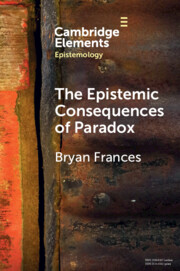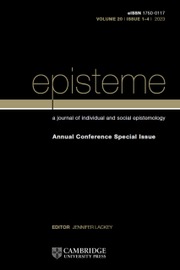The Epistemic Consequences of Paradox
By pooling together exhaustive analyses of certain philosophical paradoxes, we can prove a series of fascinating results regarding philosophical progress, agreement on substantive philosophical claims, knockdown arguments in philosophy, the wisdom of philosophical belief (quite rare, because the knockdown arguments show that we philosophers have been wildly wrong about language, logic, truth, or ordinary empirical matters), the epistemic status of metaphysics, and the power of philosophy to refute common sense. As examples, this Element examines the Sorites Paradox, the Liar Paradox, and the Problem of the Many – although many other paradoxes can do the trick too.
Product details
No date availableAdobe eBook Reader
9781009062138
0 pages
Table of Contents
- 1. Introduction
- 2. Our Six Topics
- 3. How To Analyze A Philosophical Problem: The Sorites
- 4. Each Disjunct Is Philosophically Counterintuitive
- 5. A Doxastically Distressing Disjunction: The Sorites
- 6. How Semantic Complexity Does And Does Not Matter
- 7. A Doxastically Distressing Disjunction: The Liar
- 8. A Doxastically Distressing Disjunction: The Problem Of The Many
- 9. Knockdown Arguments And Philosophical Agreement
- 10. Metaphysical Bullshit
- 11. Philosophical Progress And Philosophical Refutations Of Common Sense
- 12. The Philosophical Significance Of Philosophical Counterintuitiveness
- 13. The Three Doxastic Responses To The Doxastically Distressing Disjunctions
- 14. The Inconsistency Response
- 15. The Confident Response
- 16. The Cautious Response
- References.





